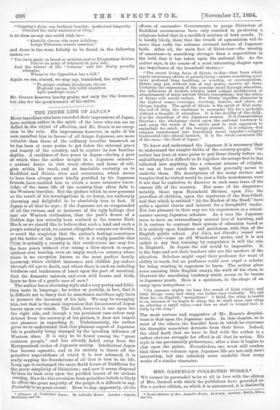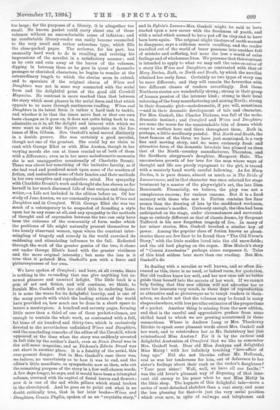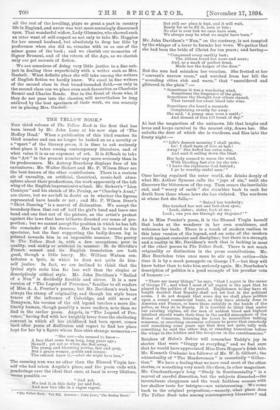MRS. GASKELL'S COLLECTED WORKS.* WE cannot be persuaded to be
at all in love with the edition of Mrs. Gaskell with which the publishers have provided us. For a pocket edition, as which it is announced, it is distinctly • Pocket Edition of Mrs. Gaskell's Works, In 8 vole. London: Smith, Elder, and Co. too large; for the purposes of a library, it is altogether too small. No known pocket could carry about one of these volumes without an uncomfortable sense of inflation; and no comfortable library-reader can easily become reconciled to the very small and rather colourless type, which fills the close-packed pages. The reviewer, for his part, has unusually hard work to do in recalling and reviving his impressions of the novelist in a satisfactory manner ; and as he cuts and cuts away at the leaves of the volumes, dipping in between them as he goes in quest of favourite passages or cherished characters, he begins to wonder at the extraordinary length to which the stories seem to extend, and to speculate if the original charm of Wives and Daughters was not in some way connected with the serial form and the delightful print of the good old Cornhill Magazine. No contrast is more marked than that between the story which most pleases in the serial form and that which appeals to us more through continuous reading. Wives and Daughters in its latest form is rather a hard task to tackle, and whether it be that the times move fast or that our own taste changes as it goes on, it does not quite bring back to us, admirable as it is, all the delight and interest with which we were wont to study the Squire and speculate on the for- tunes of Mrs. Gibson. Mrs. Gaskell's mind moved distinctly in a double groove. She was certainly a good novelist, though not one of the greatest. She could lay no claim to rank with George Eliot or with Miss Austen, though in her varying moods she can at times remind us of both of them with a difference ; even as in her more melodramatic moments she is not unsuggestive occasionally of Charlotte Brontë. There was about her something of the imitative faculty, as if she had read and pondered much upon some of the masters of fiction, and assimilated some of their fancies and their methods in her own receptive and reproductive mind. Her sympathy with Charlotte Bronto's work and thought she has shown us for herself in her much discussed Life of that unique and singular writer,—a Life not included in the edition before us. Of her study of Jane Austen, we are constantly reminded in Wives and Daughters and in Cranford. With George Eliot she was too much of a cotemporaa7 to be suspected of founding a style upon her in any sense at all, and any sympathy in the methods of thought and of expression between the two can only have been the outcome of the community of form under which the problems of life might naturally present themselves to two keenly observant women, upon whom the constant inter- mingling of tragedy and comedy in the world exercised its saddening and stimulating influence to the full. Reflected through the work of the greater genius of the two, it shone out under George Eliot's hand with the greater vividness and the more original intensity ; but none the less is it true that it pointed Mrs. Gaskell's pen with a force and picturesqueness of her own.
We have spoken of Cranford ; and here, at all events, there is nothing in the re-reading that can give anything but re- newed pleasure and unmixed delight. The little book is a gem of art and fiction, and "will continue, we think, to furnish Mrs. Gaskell with her chief title to enduring fame. It is none the worse for its delightful brevity, and is one of the many proofs with which the leading artists of the world have provided us, how much can be done in a short space to insure a masterpiece. A hundred and seventy pages, forming little more than a third of one of these pocket-volumes, are enough to contain the whole work, as contrasted with a full, fat tome of six hundred and thirty-two, which is exclusively devoted to the nevertheless unfinished Wives and Daughters, and the concluding remarks of the editor of the Cornhill, which appeared at the time when the story was suddenly arrested in full tide by the author's death, even as Denis Duval was in the self-same magazine, and as Dickens's Edwin Drood was cut short in another place. It is a fatality of the serial, this ever-present danger. But in Mrs. Gaskell's case there was, we believe, no uncertainty as to how it was to end, and the editor's little manifesto, as sympathetic now as then, sets out the remaining purpose of the story in a few well-chosen words. A few days longer, he says, and it would have been a triumphal column, crowned with its capital of festal leaves and flowers ; now it is one of the sad white pillars which stand broken in the churchyard. And he goes on to point out what is no doubt critically true, that in her later books—Wives and Daughters, Cousin Phyllis, spoken of as an "exquisite story," and in Sylvia's Lovers—Mrs. Gaskell might be said to have started upon a new career with the freshness of youth, and with a mind which seemed to have put off its clay and to have been born again. The original slight tincture of earth seemed to disappear, says a criticism worth recalling, and the reader travelled out of the world of baser passions into another full of mistake and suffering, but none the less a world of calm feelings and of wholesome lives. We presume that this contrast is intended to apply to what we may call the mise-en-seime of a story like Wives and Daughters, as contrasted with that of Mary Barton, Ruth, or North and South, by which the novelist attained her early fame. Certainly no two types of story can be more different; and they will remain the favourites with two different classes of readers accordingly. But those Northern stories are wonderfully strong ; strong in their grasp of human passion of the intenser kind ; strong in their local colouring of the busy manufacturing and mining North; strong in their dramatic plot—melodramatic, if you will, sometimes —and in their dramatic development of talc and character. For Mrs. Gaskell, like Charles Dickens, was full of the melo- dramatic instinct ; and Cranford and Wives and Daughters are none the worse for the unmistakable bits of drama which come to surface here and there throughout them. Ruth is perhaps, a little needlessly painful. But North and South, the least famous of the three we have just mentioned, is a very fine and moving story, and no more curiously fresh ant/ attractive form of the domestic love-tale has pleased us than that of the North -country manufacturer, Thornton, and the Southern clergyman's daughter, Margaret Hale. The unconscious growth of her love for the man whose ways of thought and life are purely repugnant to the girl, is traced with a masterly hand worth careful following. As for Mary Barton, it is pure drama, almost as much as is The Bride of Lammermoor, and in that character was once selected for stage treatment by a master of the playwright's art, the late Dion Boucicault. Financially, we believe, the play was not a conspicuous success; for various reasons. But it is a fixed memory with those who saw it. Fiction contains few finer scenes than the drawing of lots by the maddened workmen, for the master's murder. Curiously enough, the idea had been anticipated on the stage, under circumstances and surround- ings so entirely different as that of classic drama, by Sergeant Talfourd is his now forgotten tragedy of Ion. In many of her minor stories, Mrs. Gaskell touched a similar key of power. Among the popular class of fiction known as ghost. stories there are few finer to be found than "The Old Nurse's Story," with the little maiden lured into the old snow-fields; and the old lord playing on the organ. Miss litdock's story of "Cousin Anestaeins " perhaps alone surpasses it. Tales of this kind seldom bear more than one reading. But Mrs. Gaskell's do.
In dealing with a novelist so well known, and so often dis- cussed as this, there is no need, or indeed room, for quotation. Her old readers know her well, and her new ones ask no better guide than herself into the secrets of her work. If we cannot help feeling that this new edition will not advertise her or serve her interests very much, in these days of reproduction so attractive and so picturesque as to tempt readers in them. selves, we doubt not that the volumes may be found in massy shapes elsewhere, with less peculiar estimates of the proportions of a pocket. Another thing is missing from the new edition, and that is the careful and appreciative preface from some skilled hand to which we are growing accustomed in these connections. Where is Andrew Lang or Mrs. Thackeray Ritchie to speak some pleasant words about Mrs. Gaskell and her work, and to reintroduce her as Mr. Saintsbury has just reintroduced Miss Austen? For it is by the curious and delightful Austenism of Cranford that we like to remember Mrs. Gaskell best. Dear old Miss Jenkyns and delightful Miss Matty ! with her infinitely touching " love-affair of long ago." Did she not likewise refuse Mr. Holbrook, real as was her tenderness for him, theout roefetdee erferdeenuceghtoterhee; sister's feelings about their rank as "Your poor sister ! Well, well, we have all our faults !" was the old lover's pleasant way of disposing of that inno- cent old enemy to his peace when he met Miss Matty iu the little shop. The keynote of this delightful tale—more a series of semi-detached sketches than a real story, and none the less pleasing for that—is just the very social position which even now, in spite of railways and telephones and all the rest of the levelling, plays so great a part in country life in England, and never was text more amusingly discoursed upon. That wonderful widow, Lady Glenmire, who showed such an utter want of self-respect as not only to take Mr. Hoggins for her second husband, but absolutely to drop her title by preference when she did so, remains with us as one of the minor gems of the book ; and we cherish our memories of Signor Brunoni, and of the return of the Aga, as we cherish only our pet morsels of fiction.
We are conscious of doing very little justice to a fine sub- ject in dealing thus superficially with a writer such as Mrs. G-askell. What definite place she will take among the writers of English fiction we hardly know. We excel in fine writers of the second class in that broad-bounded field,—as only in the second class can we place even such favourites as Charlotte Brontë and Charles Reade. But in the front of those who, if they do not pass into the classics, will nevertheless be long outlived by the best specimen of their work, we can scarcely err in placing Mrs. Gaskell.




















































 Previous page
Previous page